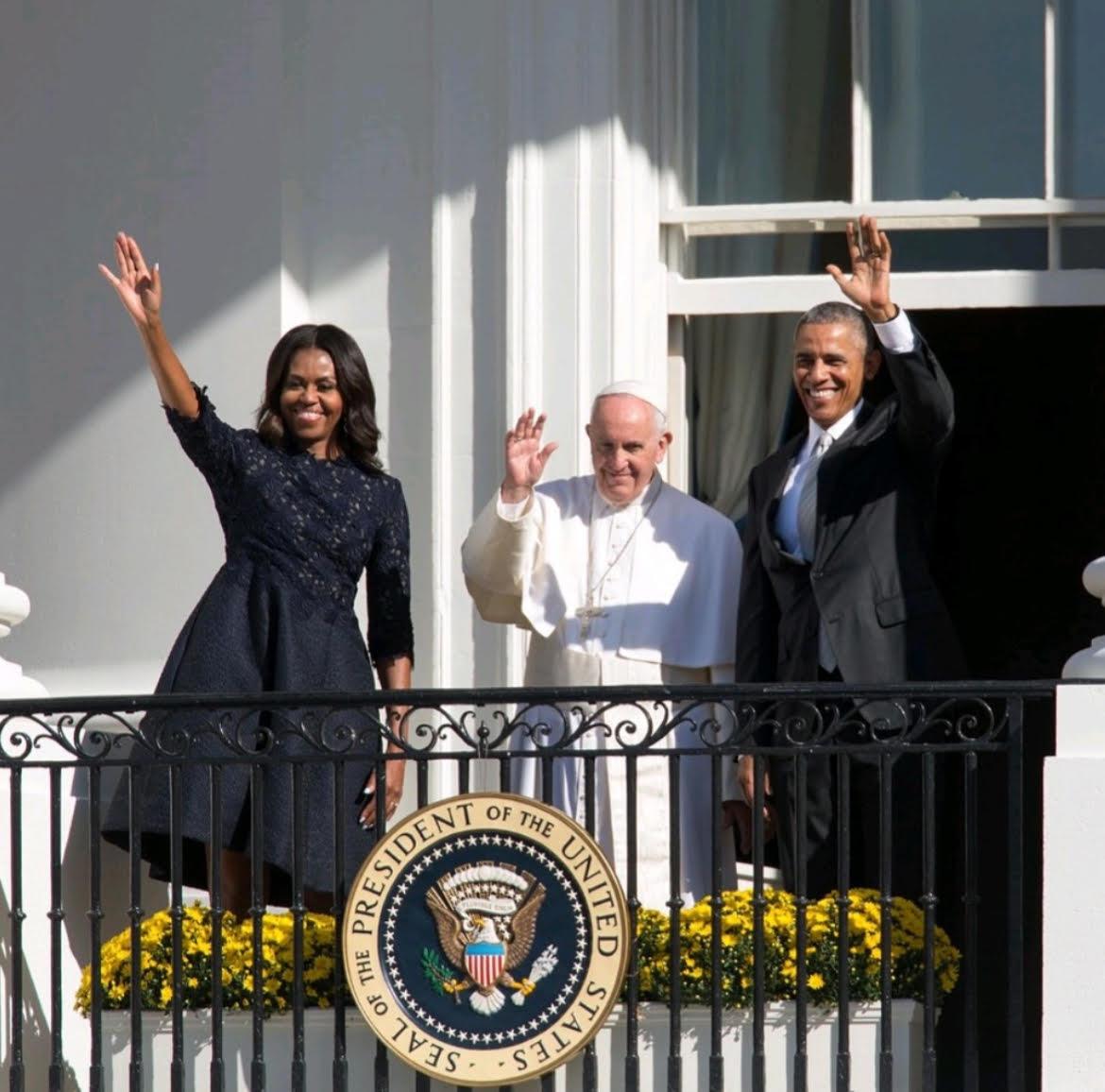Taken by Prosy Abarquez-Delacruz, 9/23/2015 when she was invited, along with 500 journalists to cover Pope Francis’ visit in the White House, representing Asian Journal Press
DISCLAIMERS first. I am not a practicing Catholic, although I was baptized as one. Faith is a deeply personal matter, and I am suspicious and skeptical of organized religion, for I see it as primarily self-serving: i.e., its leaders see themselves as primarily charged with promoting the organization and insuring its long term survival. These are not unlike the mandate of a typical CEO. Except that religious organizations have a constituency, its faithful, who depend on it for spiritual and moral guidance, and thus, enlightened leadership. Perhaps I am biased by the knowledge of friar abuses during the Spanish colonial period.
I understand that Pope Francis emerged as a viable candidate for the papacy, from his remarks during the conclave about the most pressing issues that should be addressed by the Catholic church and the papacy. The conclave apparently agreed, and elected him pope. The news of Pope Francis’s passing, while not unexpected given his recent struggles with pneumonia – an opportunistic illness that pounces when one is tired and fatigued – is still sad and mournful. We have lost an exemplary human being, known for his humility and compassion, and a shining role model for everyone, regardless of creed, class, cultural or ethnic identity. Even as I distance myself from the church, I have friends within it, priests and parish CEOs whom I admire. I keep these relations personal and separate from their religious ministry. I respect them as individuals, and recognize their talents and achievements, even as I see them as advocates for a religion. But this is because I have met them personally, even breaking bread with them, so to speak. Pope Francis is somehow different. I only know of him through press coverage as the CEO of the largest faith-based organization on Earth. It is thru these that I recognize his efforts to transform the Catholic church (e.g., his efforts to enlarge the role of women in the organizational hierarchy, and his recognition of LGBTQ individuals as rightful members of his congregation). While he did not extend the Sacrament of Marriage to them, he recognized civil unions among them.
Also notable are Pope Francis’ efforts to root out pedophilia covered up for decades by the church’s all-male hierarchy. I actually find it disgusting that the hierarchy has sought to hide these crimes from the faithful. For an organization to engage in cover-up, when its claim to legitimacy is its moral leadership, demonstrates that it has lost its sense of direction and mission. Pope Francis, as the church’s CEO, sought reform, even rooting out corruption and entitlement in the Vatican. But these are acts normally
expected of a CEO of any organization, including the Catholic church. What I find surprising is the level of resistance that Pope Francis encountered in these efforts.
As the leader of the Catholic church, Pope Francis has consistently championed the less fortunate and disadvantaged in society. Lately, he has added immigrants seeking to escape political oppression and grinding poverty to this list. During his travels he has made it a point to highlight their condition while asking for compassion and mercy from those in power.
We are all familiar with the pope’s soft spoken and measured speaking style. Perhaps because he is most aware that as pope, his words are regarded as oracle, measured, and precisely weighted. Social media postings about encounters with the pope have actually been more revealing about this pope’s humility and humanity. These are his “unofficial” acts: The delight he takes in interacting with children, exhibiting genuine compassion for their fears and uncertainties, and yet able to offer reassuring wisdom.
His humanity and total lack of affectation and ego are remarkably illustrated by an incident shortly after his release from the hospital, when he sought to mingle with the crowds at the Vatican square, incognito, seated on a wheelchair with his oxygen tank, and dressed only in a white shirt and a blanket on his lap, bereft of any identifying official vestments or accessories.
Even though he exercises tremendous moral authority, he is non-judgmental, as shown by his openness to meet with anyone who seeks audience with him, even though he is well aware that many of these individuals are seeking to legitimize themselves via a photo-op with him. This is obvious in the recent visit of a high political official, known to be petty and vindictive. Pope Francis’ efforts to be among the faithful in Vatican square during the holiest period of the Catholic year, and his efforts to continue to perform duties expected of him during this period despite failing health and great physical difficulty are selfless and heroic.
It is a special privilege to be living in a period when a human being like Pope Francis also existed.
* * *
The opinions, beliefs and viewpoints expressed by the author do not necessarily reflect the opinions, beliefs and viewpoints of Asian Journal, its management, editorial board and staff.
* * *
Enrique de la Cruz, Ph.D., is Professor Emeritus of Asian American Studies at California State University, Northridge.





